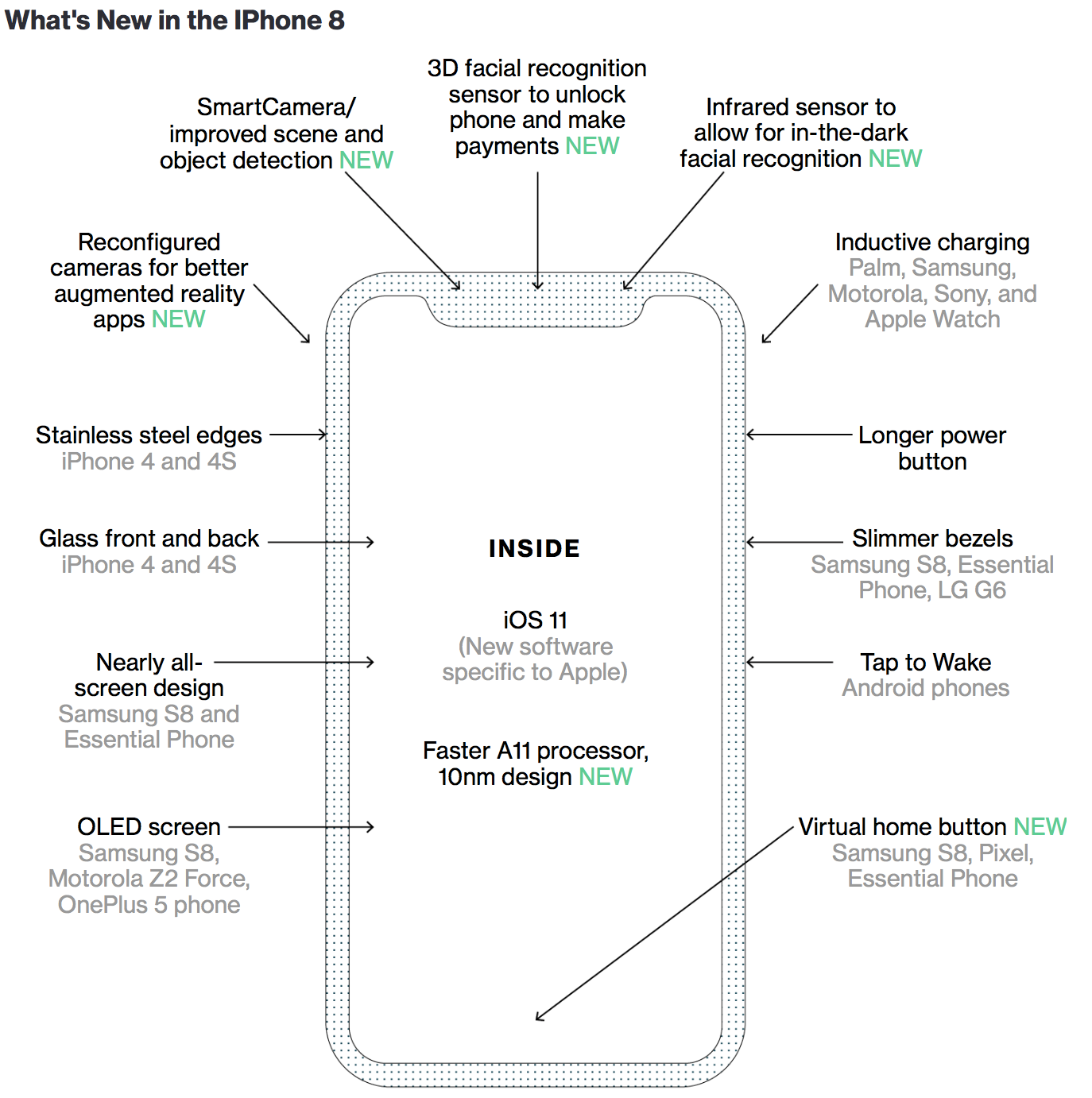
Bloomberg’s Mark Gurman today ran an interesting roundup of all the expected new features said to be coming to Apple’s tenth anniversary iPhone and who actually got there first.
Titled “What’s New in the iPhone 8” and accompanied by some nice illustrations, the article distinguishes between the new features iPhone 8 will have before any of its rivals and those that have been around for years on non-Apple smartphones.
Rather than position the OLED iPhone as a case-study of innovation, the article outlines Apple’s follow-and-perfect philosophy and describes the upcoming tenth anniversary iPhone as a matter of perfecting features that are already out there in rival devices.
“While Apple invented the modern smartphone, it has since mostly played catch-up with competitors,” Gurman wrote. “A few times it got there first.”
Brand new iPhone 8 features include:
- Reconfigured cameras—for better augmented reality apps
- Smart Camera features—improved scene and object detection, in real-time
- 3D sensor—3D facial recognition to unlock the phone and authorize payments
- Infrared sensor—for in-the-dark facial recognition
- Faster A11 chip—fabricated using TSMC’s latest ten-nanometer process technology
The author describes Apple’s new 3D face scanner as being able to unlock the OLED handset in a few hundred milliseconds, calling the sophisticated feature iPhone 8’s “crown jewel”.
Some of the more important upgrades that were seemingly borrowed from previous iPhone models and can also be found on competing handsets from other vendors include:
- Nearly full-screen design—Galaxy S8 got there first
- Stainless steel edges—as seen on the iPhone 4/4s series
- Glass front and back—glass sandwich design was clearly borrowed from iPhone 4/4s
- Tap to Wake—as featured on some Android phones
- Slimmer bezels—popularized by Samsung’s Galaxy series, Essential Phone and LG’s G6
- OLED display—a common feature on high-end Android handsets such as Samsung’s Galaxy S8, Motorola’s Z2 Force, OnePlus 5 and others
- Inductive charging—wireless charging based on inductive technology has been used for years in Apple Watch as well as many flagship Android phones, including devices from Samsung, Motorola, Sony and Palm (on 2009’s Palm Pre)
- Virtual Home button—although Galaxy S8, Essential Phone and Google’s Pixel series all have virtual Home buttons, Apple’s implementation should be more functional with a Touch Bar-like gestural area at the bottom
Like many other outlets, Bloomberg expects to see three new iPhones this year: successors to the iPhone 7/Plus family as well as a brand new, revamped model that sits at the high-end.
Fact: Apple and iPhone are a great deal responsible for that Android phone you enjoy today
— Christian Zibreg (@dujkan) August 18, 2017
All three new iPhones will have the usual upgrades like faster processors, but only the revamped OLED-based handset will provide Apple’s best technologies and features that haven’t been tried in a smartphone before, like 3D facial recognition.
Here’s an interesting excerpt from the write-up:
Apple is bringing some new ideas to the table. To replace the Home button, the company is creating a software-based controls area at the bottom of the phone, which could be a step up from the basic controls on home button-less Android phones.
Like iPhone 7 Plus, the new device will feature two rear cameras, but now they’ll sit one atop the other rather than side by side, a configuration that could make augmented reality apps work better.
This iPhone upgrade will also mark the first time that a smartphone maker’s complete lineup will use the same, more efficient 10nm processor (Samsung’s S8 features two different types of that chip depending on where you buy it).
Upgrades to core technologies aside, the new iPhone’s crown jewel will be a 3-D facial scanning sensor that will unlock device and authenticate purchases—an industry first.
At any rate, Apple’s “best, not first” philosophy seems to be paying off because the company has been able to spur widespread iPhone adoption by implementing features from rival devices in its own way—no one does this better than Apple—which has resulted in 1.2 billion iPhone sales to date since the original model debuted back in 2007.
Graphics: Mira Rojanasakul